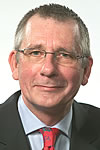A European public prosecutor’s office? Not while OLAF needs straightening out
A European public prosecutor’s office? Not while OLAF needs straightening out
Yesterday it was announced that former European Commissioner John Dalli would not be subject to prosecution before the Maltese courts, despite an investigative report from EU fraud watchdog OLAF which implicated him. Commenting on the affair, SP Euro-MP Dennis de Jong said: ‘Up to now I didn’t really believe that Dalli had been sacked by Commission President Jose Barroso because his proposal for new tobacco legislation was badly received by the tobacco lobby, but that there was reliable evidence that he was involved in corruption. The decision of the Maltese judged demonstrates, however, that OLAF messed up, which is why I’m demanding a comprehensive enquiry into just what is going on. In my view the position of the head of OLAF, Giovanni Kessler, has become untenable.´
 The supervisory committee which oversees OLAF has recently presented stern criticisms of the organisation’s working methods. The committee was not informed about the Dalli affair until after the event and was shocked by the number of procedural errors made by OLAF during the investigation. ´It’s clear that OLAF was in a state of panic and had to bring out a damning report on Dalli quickly,’ says De Jong. ‘Of course I also think, as vice-chair of the European Parliament special committee on organised crime and corruption, that abuses must be addressed quickly, especially if they involve a European Commissioner. But this affair stinks. The rights of the accused have been trampled on and the Maltese judge’s decision shows that the evidence against Dalli was wafer-thin. In the light of various reports the European Parliament Committee on Budgetary Control, of which I’m a member, will be looking into the way OLAF functions. I’ll be keeping right on top of this.’
The supervisory committee which oversees OLAF has recently presented stern criticisms of the organisation’s working methods. The committee was not informed about the Dalli affair until after the event and was shocked by the number of procedural errors made by OLAF during the investigation. ´It’s clear that OLAF was in a state of panic and had to bring out a damning report on Dalli quickly,’ says De Jong. ‘Of course I also think, as vice-chair of the European Parliament special committee on organised crime and corruption, that abuses must be addressed quickly, especially if they involve a European Commissioner. But this affair stinks. The rights of the accused have been trampled on and the Maltese judge’s decision shows that the evidence against Dalli was wafer-thin. In the light of various reports the European Parliament Committee on Budgetary Control, of which I’m a member, will be looking into the way OLAF functions. I’ll be keeping right on top of this.’
Only today the EP voted on the interim report of the special committee on organised crime and corruption. ‘It’s good that cross-border crime is being taken seriously by the EU, and the report itself contains a lot of good ideas,’ concedes De Jong. ‘But it’s bizarre that as a result of massive pressure from OLAF, the report calls for the establishment of a European Public Prosecutor’s Office. It’s well-known in Brussels that OLAF is trying to create a role for itself here, and that the Commission constantly points to the failure of member states to follow up on calls from OLAF. The question, however, is whether this is the fault of the member states or a result of the quality of OLAF’s investigations. If the European Commission can’t vouch for the quality and independence of its own anti-fraud watchdog, I wouldn’t have much faith in the quality of a European Public Prosecutor’s Office.’
